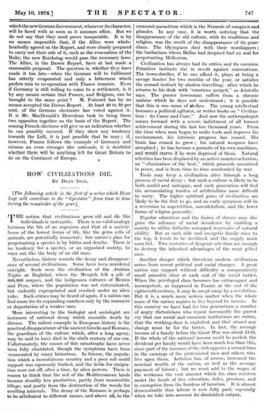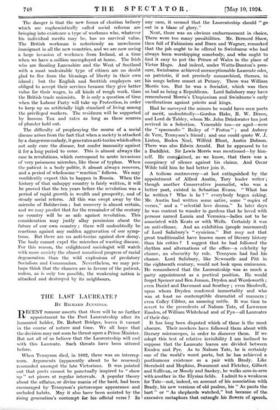[The following article is the first of a series which
Dean Inge will contribute to the "Spectator" from time to time during the remainder of the year.].
THE notion that civilizations grow old and die like individuals is untenable. There is no valid analogy between the life of an organism and that of a society. Some of the lowest forms of life, like the germ cells of animals, are potentially immortal ; but nature's plan for perpetuating a species is by births and deaths. There is no tendency for a species, or an organized society, to wear out like the body of an old man.
Nevertheless, history records the decay and disappear- ance of several civilizations. Some have been murdered outright. Such were the civilization of the Arabian Nights at Baghdad, where the Mongols left a pile of 800,000 corpses, and the indigenous cultures of Mexico and Peru, where the population was not exterminated, but violently expropriated and crushed under an alien yoke. Such crimes may be heard of again, if a nation can find room for its expanding numbers only by the massacre or deportation of a weaker race.
More interesting to the biologist and sociologist are instances of national decay which resemble death by disease. The salient example in European history is the practical disappearance of the ancient Greeks and Romans, the guardians of the culture which, after a long agony, may be said to have died in the sixth century of our era. Unfortunately, the causes of this catastrophe have never been fully elucidated, though the symptoms have been enumerated by many historians. In Greece, the popula- tion which a mountainous country and a poor soil could support was rigorously limited, and the fields for emigra- tion were cut off, after a time, by alien powers. There is reason to think that the soil of the Mediterranean lands became steadily less productive, partly from unscientific tillage, and partly from the destruction of the woods for smelting minerals. The decay of the Romans is perhaps to be attributed to different causes, and above all, to the economic parasitisM which is the Nemesis of conquest and plunder. In any case, it is worth noticing that the- disappearance of the old culture, with its traditions and religion, was the result of the disappearance of its guar- dians. The Olympians . died With their worshippers ; the barbarians whom Hellas had despised had no zeal for perpetuating Hellenism. '
Civilization has always had its critics and its enemies. Primitive instincts rise in revolt against conventions. The town-dweller, if he can afford it, plays at being a savage hunter for two months of the year, or satisfies the nomad instinct by aimless travelling; after which he returns to his desk with "emotions purged," as Aristotle says. The poorer townsman suffers from a chronic malaise which he does not understand ; it is possible that this is one cause of strikes. The young intellectual becomes a political agitator, or writes books on " Civiliza- tion : its Cause and Cure." And now the anthropologist comes forward with a severe indictment of all human achievement during the last ten thousand years. From the time when man began to make tools and improve his environment, his intrinsic progress has ceased. His brain has ceased to grow ; his natural weapons have atrophied ; he has become a parasite of his own machines, and would starve if he were deprived of them. Natural selection has been displaced by an active counter-selection, an " elimination of the best," which proceeds unnoticed in peace, and is from time to time accelerated by war.
Tools may keep a civilization alive through a long process of racial decay ; but such a culture is likely to be both sordid and unhappy, and each generation will find the accumulating burden of artificialities more difficult to carry. The higher spiritual gains of civilization are likely to be the first to go, and an early symptom will be a reversion to superstition, sacerdotalism, and the lower forms of religion generally.
Popular education and the fusion of classes may dis- guise the advance of racial decadence by enabling a society to utilize hitherto untapped reservoirs of natural ability. But as each able and energetic family rises to the top, it tends to be sterilized, and the supply must soon fail. Two centuries of dysgenic selection are enough to destroy the inherited advantages of the most gifted race.
Another danger which threatens modern civilization arises from recent political and social changes. A great nation can support without difficulty a comparatively small parasitic class at each end of the social ladder. When the privileged class becomes too extravagant and incompetent, as happened in France at the end of the eighteenth century, it may be swept away by a revolution. But it is a much more serious matter when the whole mass of the nation aspires to live beyond its income. In this country we have had for two generations a number of angry rhetoricians who repeat incessantly the parrot cry that our social and economic institutions are rotten, that the working-class is exploited, and that almost any change must be for the better. In fact, the average income of a family before the Great War was about £145. If the whole of the national income could be pooled; the dividend per family would have been much less than this, since part of the incomes of the rich appears a second time in the earnings of the professional men and others who live upon them. Inflation has, of course, increased the nominal wealth of the nation, as well as the average payment of labour ; but we must add to the wages of the workman the vast amount which his class receives under the heads of free education, doles, pensions, and in exemption from the burdens of taxation. It is almost demonstrable that labour is now fully paid, especially when we take into account its diminished output. The danger is that the new forms of election bribery which are euphemistically called social reforms are bringing into existence a type of workman who, whatever his individual merits may be, has no survival value. The British workman is notoriously an unwelcome immigrant in all the new countries, and we are now seeing a large invasion of workmen from Ireland, at a time when we have a million unemployed at. home. The Irish who are flooding Lancashire and the West of Scotland with a most undesirable type of citizen are no doubt glad to flee from the blessings of liberty in their own island ; but the English and Scottish employers are obliged to accept their services because they give better value for their wages, in all kinds of rough work, than the British trade unionists. It is only a question of time when the Labour Party will take up Protection, in order to keep up an artificially high standard of living among the privileged workers. The residuum will be supported by Income Tax and rates as long as these sources of plunder hold out.
The difficulty of prophesying the course of a social. disease arises from the fact that when a society is attacked. by a dangerous malady, it generates anti-toxins which often not only cure the disease, but confer immunity against it for a long period to come. This is almost always the case in revolutions, which correspond to acute invasions of very poisonous microbes, like those of typhus. When the• patient is a body politic, it almost always recovers, and a period of wholesome " reaction" follows. We may confidently expect this to happen in Russia. When the history of that unhappy country is fairly written, it will be proved that the ten years before the revolution was a period of rapid growth in wealth and prosperity, and of; steady social reform. All this was swept away by the microbe of Bolshevism ; but recovery is almost certain, and we may predict that for the remainder of the century no country will be so safe against revolution. This consideration may justly allay pessimism about the future of our own country ; there will undoubtedly be reactions against any sudden aggravation of our symp- toms. But there are no anti-toxins against slow decay. The body cannot expel the microbes of wasting disease. For this reason, the enlightened sociologist will watch with more anxiety the almost unnoticed progress of racial degeneration than the wild explosions of predatory Socialism and Communism. Nevertheless, we may per- haps think that the chances are in favour of the patient, unless, as is only too possible, the weakening nation is attacked and destroyed by its neighbours.







































 Previous page
Previous page